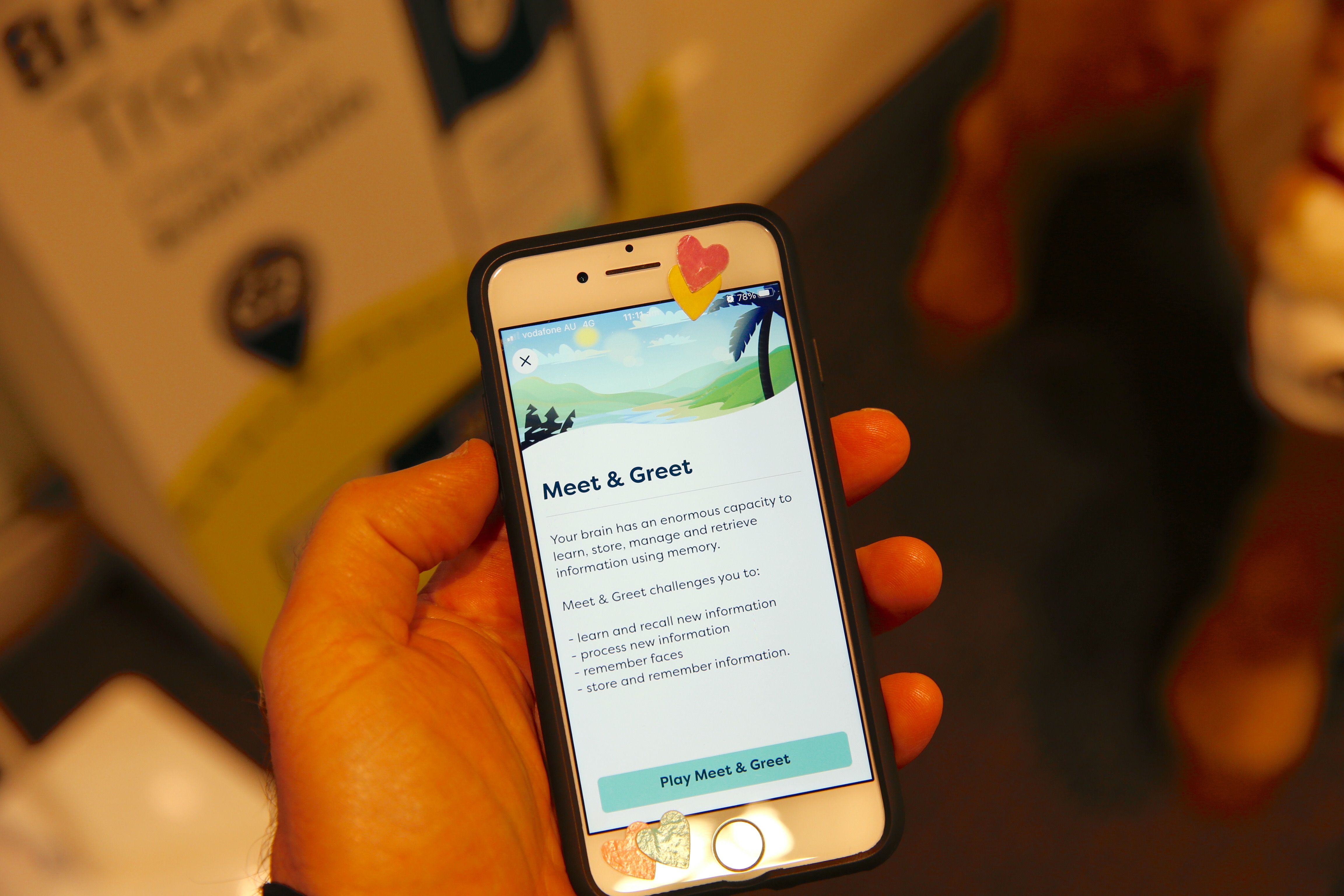The team members behind the BrainTrack app – designed to encourage more timely dementia diagnoses and already downloaded more than 70,000 times – says iAwards success helped to validate and promote their innovation.

Kelly Burns, Lead Learning Designer at Dementia Australia and Andrew Vouliotis, Product Manager at Deakin’s Applied Artificial Intelligence Institute, at the 2023 iAwards National Ceremony.
More than 421,000 Australians live with dementia and this number is expected to almost double by 2054. Dementia can affect thinking, memory and behaviour, and is a leading cause of death in older Australians.
Yet despite its prevalence, dementia can be hard for an individual and their family to identify, says Kelly Burns, lead learning designer in Dementia Australia’s Business Innovation team.
“Family members may notice dementia in a person three years prior to a diagnosis,” Kelly says. “Symptoms emerge but sometimes people just put it down to ageing.”
That’s where the free BrainTrack app, developed by Dementia Australia and Deakin University’s Applied Artificial Intelligence Institute, aims to help by encouraging users towards a timely diagnosis.
“We say timely diagnoses – not early diagnoses – because it’s about the user being ready to explore those symptoms, being able to accept those changes and start to receive support and care.”
Kelly, who has a clinical background specialising in dementia assessment, notes that the app can help users and families to “start the conversation around dementia”, reduce the stigma and anxiety and to begin the cognitive testing journey.
How BrainTrack tests cognitive health
BrainTrack, released in late 2022, asks the user to complete a series of cognitive tests that measure how their brain is functioning.
One test, for example, replicates a travel scenario at a baggage claim to assess a user’s visual process, attention and processing speed.
“The user is given a particular bag, with a specific shape, colour and pattern, and they have to tap that bag as it comes across the screen,” Kelly explains. “Then the bag that the user must identify changes each round and starts to travel faster across the screen.”
The app then provides reports that let the user see how they are tracking over time and what to do with the results. For example, they may be recommended to contact their GP if they notice a change in their performance.
The app is engaging with the right audience; people in their seventies are most likely to download it, followed by those in their sixties. “We also have really good rural and remote reach, which is important because sometimes access to healthcare in these areas is more difficult.”
The app’s reach has gone beyond Australia, with people across the globe using it too.
The tech driving the app
The mobile app has been built using Flutter, which allows the team to write code once and then deploy it across iOS and Android devices. It employs Firebase for crash analytics and to help identify and resolve any critical bugs.
The app also uses Amazon’s S3 cloud storage to store the millions of JSON files collected for the Medical Research Future Fund research trial. This component of the app can be shut down at the end of the research trials without impacting the app’s functionality.
Multiple benefits to iAwards experience
Taking the top spot in the Not-for-Profit & Community category was a thrill, Kelly says. “It was so exciting, particularly given the quality of other nominees.”
The “amazing” engagement with and feedback from judges, including the head judge Lisa Shaw for their category and iAwards Chief Judge Collins Rex, at the National Ceremony and the wonderful sense of collegiality among other nominees was a highlight.
The iAwards win took the team to the Asia Pacific ICT Alliance (APICTA) Awards where they received a merit recognition in the Health and Wellbeing category.
Kelly says their national and international awards journey and being in front of judges helped the team to perfect its product pitch. “The recognition also validates the quality of that app and gives us the opportunity to promote it as an “award winning” app.”
Note: Western Australian innovators enter the iAwards National competition through the state-based INCITE Awards. Entries close Tuesday 2 April.
Tasmanian innovators enter through the TasICT Awards.





